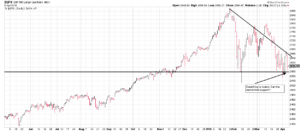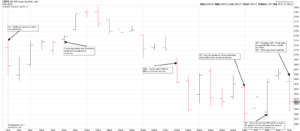HIGHLIGHTS
- Stocks fall by 1.36%.
- Equities are in a dangerous spot from a technical perspective.
- Trade news has the market in a tug of war.
- Employment numbers were below estimates.
MARKET RECAP
Equity markets were in a tug of war all week over trade news, moving up and down, finally finishing the week off by 1.36%. International stocks dropped by 0.87%. The market has now moved intraday by more than 1% in 9 of the last 11 sessions, that is more than all of 2017. Prices are back again to their 200-day moving average, a marker used by many technical analysts to determine if the market is in bull or bear mode. Equities are also close to breaching through support, a dangerous condition that led to falls in 1962 and 1987 when the economy was not in recession mode but did carry similar valuations.
Bonds fell by 0.09%. The 10-year treasury yield increased by 3 basis points to 2.77%.
TRADE
The Trump administration seems to be doing everything possible to derail the economy and the markets as tensions flare between the US and China over trade. It is true that China does not operate by the same rules as the US in many regards. Chinese trade policy forces technology transfer, takes US intellectual property, forces American companies into partnerships with Chinese entities, and imposes steeper tariffs on American imports than the other way around. But at the same time, China has been moving in the right direction, albeit slowly. And the Trump playbook of publicly attacking Chinese trade policy may not work from a cultural perspective and might box the Chinese into a difficult spot. Unfortunately, this is how trade wars start. The hope is all these threats and tariffs will lead to real negotiations that can produce a fair agreement before more serious damage is done.
Make no mistake about it, there are no winners in an all-out trade war. As most Americans should remember from their middle school or high school education, a contributing factor and perhaps the main factor in the Great Depression was the Smoot-Hawley tariffs of 1930, which led to a full-scale trade war and a subsequent collapse in economies around the world.
For now, the conventional wisdom is that we are not close to a trade war. That common sense and good economic policy will prevail, and that this will all work out in the end. We hope so but are not so sure. A lot of this market rally has been based on optimistic earnings projections, and the threat of a trade war or its eventual implementation will start bringing down forecasts which would bring down equity prices. At that point, the economy could reach a tipping point that could accelerate the start of the next recession. That would also be political suicide for team Trump.
For now, earnings forecasts remain steady. But as the earnings season shortly begins, it will be interesting to see how companies comment on how future business might be impacted.
The market is hypersensitive to a trade war threat. Equities moved up and down all week as the trade news flipped from negative to not so negative and then back to negative (see below).
EMPLOYMENT
Non-farm payrolls increased by 103,000, much less than the 178,000 estimate. However, the longer-term trend is very positive, plus 202,000 per month over the last three months. Unemployment remained steady at 4.1%. Average hourly earnings were up by 0.3% for the month and are now up 2.7% year over year. The average workweek stayed the same at 34.5 hours.
SCOREBOARD



